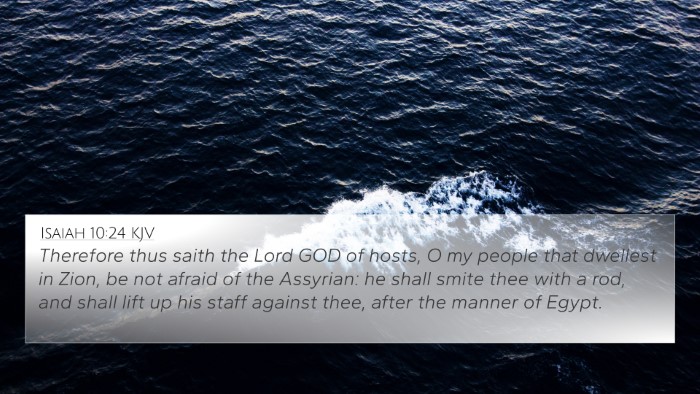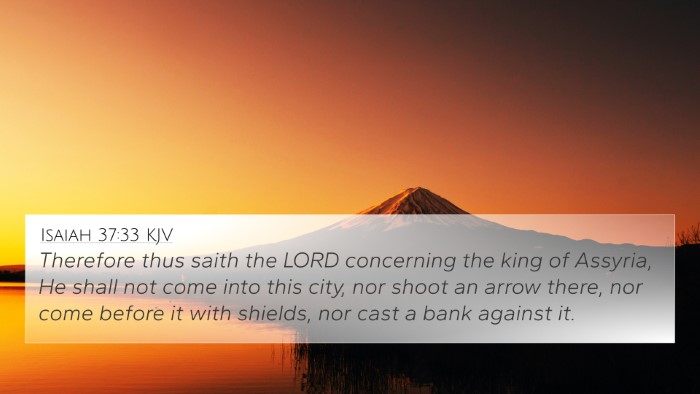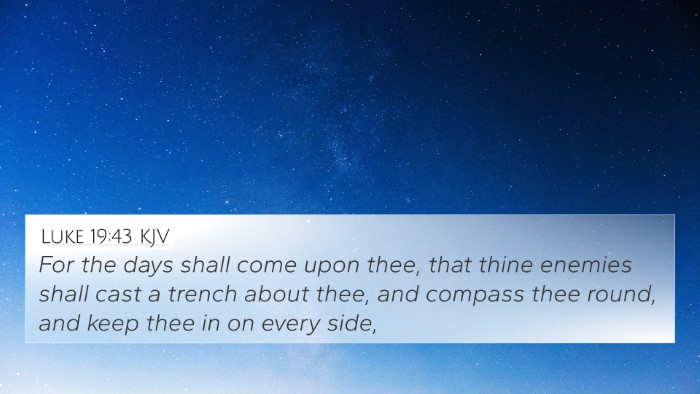Understanding 2 Kings 19:32
In 2 Kings 19:32, we encounter a pivotal moment within the narrative of the Assyrian siege against Jerusalem, where the Lord delivers a message of salvation and assurance to His people through King Hezekiah. This verse emphasizes God's ultimate authority and power to protect His chosen ones, providing profound theological insights and practical applications for believers.
Verse Context and Meaning
This verse is set against the backdrop of a dire situation. The Assyrian king, Sennacherib, had laid siege to Jerusalem, threatening to capture it and destroy its inhabitants. The tone of despair is palpable, but in such moments, God intervenes. The verse reads:
"Therefore thus says the LORD concerning the king of Assyria, He shall not come into this city, nor shoot an arrow there, nor come before it with a shield, nor cast a bank against it." (2 Kings 19:32, ESV)
Theological Insights
Theological commentary from various public domain sources highlights key themes surrounding this verse:
- Divine Protection: Matthew Henry emphasizes that God’s protection is certain and that His promises stand firm, despite the apparent might of the enemy.
- Assurance of Victory: Albert Barnes notes that this verse illustrates God's decisive power over nations, assuring that He is in control of the outcomes in the world.
- Covenantal Faithfulness: Adam Clarke reflects on the fidelity of God to His covenant promises, underlining that the Lord defends His people from oppressors just as He has promised.
Cross-Referencing Biblical Texts
Understanding 2 Kings 19:32 benefits significantly from cross-referencing with other scriptures. Below are key biblical passages that relate and enhance the interpretation of this verse:
- Isaiah 37:33-35 - This prophetic text parallels the message given in 2 Kings, emphasizing that Sennacherib will not enter the city.
- Psalm 46:1-3 - Highlights God's role as a refuge and strength in times of trouble, reassuring believers of His presence during crises.
- Jeremiah 17:5-8 - Discusses the contrast between relying on man versus trusting in the Lord, resonating with Hezekiah's reliance on God.
- 2 Chronicles 32:21 - Offers a narrative of God’s deliverance from the same Assyrian threat, illustrating His intervention and protection.
- Hebrews 13:6 - Quotes the Lord's assurances, emphasizing believers' trust amid fear, akin to Hezekiah’s dependence on God.
- Romans 8:31 - Posits the powerful question, “If God is for us, who can be against us?” echoing the sentiment of divine support in 2 Kings.
- Matthew 28:20 - Christ’s assurance of His eternal presence serves to comfort and strengthen believers as God did for Jerusalem.
Application and Reflection
The implications of 2 Kings 19:32 for modern believers are immense. It serves as a reminder of God’s faithfulness and protective nature. There are several applications one could derive:
- Trust in Adversity: as believers encounter their own “Sennacheribs,” this verse invites them to trust in God’s might and promises.
- Prayer and Supplication: Hezekiah’s example of seeking God in fear encourages believers to turn to prayer in personal crises.
- Recognizing God’s Sovereignty: The understanding of divine intervention shapes a believer's worldview, emphasizing that God can intervene in seemingly hopeless situations.
Concluding Thoughts
In conclusion, 2 Kings 19:32 is not merely a historical account but a profound testament to God's unwavering fidelity and protective nature. Cross-referencing this verse with others enriches the study and underscores the interconnectedness of Scripture. By understanding the full scope of God’s promises and actions in both the Old and New Testaments, believers can find great hope and encouragement in their faith.
Further Studies on Cross-Referencing
For those interested in delving deeper into cross-referencing and understanding connections between Bible verses, consider exploring:
- Tools for Bible cross-referencing
- Bible concordance for thematic studies
- Methods of linking Bible scriptures for better comprehension
Whether for personal edification or sermon preparation, the practice of inter-Biblical dialogue through cross-referencing yields invaluable insights and enriches the believer's understanding of God's Word.









